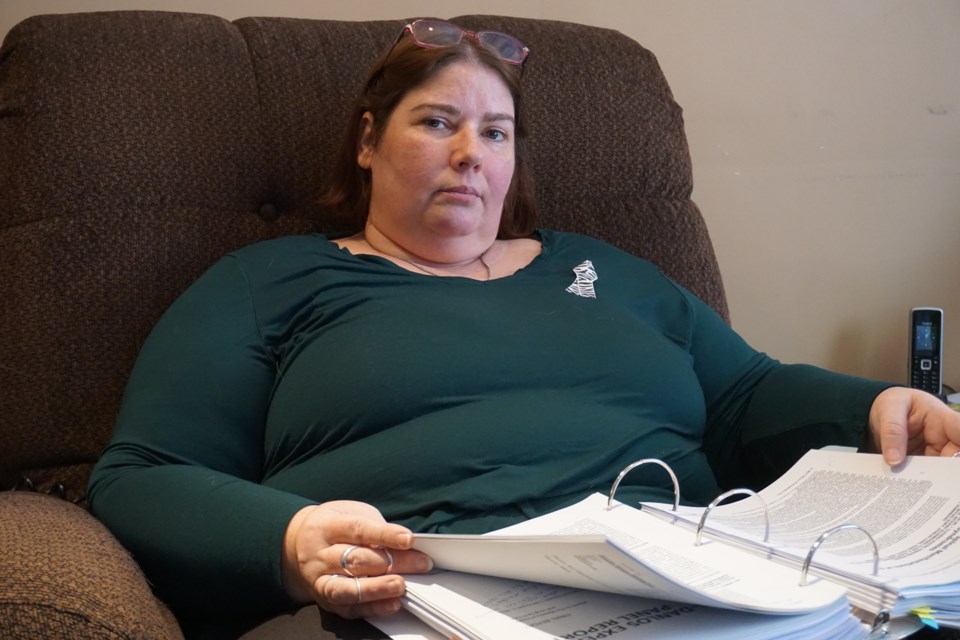The waiting continues for Tammy Stadt.
While the Midland woman is still awaiting surgery she feels will drastically improve her life, she’s also now waiting for the results from a hearing in Toronto earlier this week.
“The hearing went fairly well,” Stadt said. “It was very emotional because quite a few of the witnesses told their stories.”
On Thursday, Stadt appeared before Ontario’s Health Services Appeal and Review Board in Toronto to appeal the province’s decision not to pay for an $800 neurological consultation by an American doctor, who recommended surgery after tests confirmed nerve and tissue damage to the bladder as a result of the spinal injury.
“I think we got the message across...that we can’t obtain care in Ontario,” said Stadt, who represented herself before the review board that heard from 13 witnesses.
But Perry Brodkin isn’t overly confident Stadt will get the relief she’s seeking.
Brodkin, who worked as OHIP’s only in-house lawyer for two decades, said the hearing system doesn’t favour the appellant.
“Ninety-eight to 99 percent of appellants are self represented and 98 to 99 percent of appeals are denied,” he said.
Stadt, who is on long-term disability from her job as a community health worker with the Barrie Community Health Centre, suffers from hypermobile Ehlers-Danlos Syndrome (hEDS), which causes painful partial and full dislocations as her connective tissues don’t hold her joints together.
In late 2018, she travelled to the United States for a consultation with neurologist Dr. Fraser Henderson as she grew more frustrated in her quest to have her debilitating illness properly treated.
According to Stadt, the only neurologist in the province who can perform the required surgery (Dr. Mohammed Shamji) sits in a jail cell after pleading guilty to murdering his wife in 2016.
But besides seeking the reimbursement, Stadt also used Thursday’s hearing to outline the hoops she has had to jump through while also outlining her immediate need for surgery, which would cost about $150,000 if performed stateside.
“My physical therapist called in about his assessments,” Stadt said, noting that her family doctor, who did the initial request for out-of-country consultation that’s now under appeal, also sent in a written submission for the appeals tribunal to consider.
“Sandy Seek, executive director of the ILC Foundation, spoke of their neurosurgery position paper and their work to obtain care for EDS patients.”
Brodkin said most appellants don’t understand the standard they have to meet in order to be successful.
“A hearing before the board is the equivalent of a medical malpractice trial in court. That means that only physicians need to testify. If none of the 13 (Stadt’s witnesses) were physicians, the appeal will be denied.”
As well, Brodkin said all it takes is one mistake on the initial application for the appeal to be denied, including failure to have a specialist sign off on the out-of-country assistance request.
“You’ve got to make sure all the i’s are dotted and all the t’s are crossed,” he said, noting the appeals process makes people feel like their voices are being heard when that’s not really the case.
“No one tells appellants the facts of life. It’s unfair. It’s cruel and unusual punishment to put people like Tammy Stadt in that position.”
Ministry of Health spokesman David Jensen said he can’t comment on individual cases, but noted the province’s Out-of-Country Prior Approval Program provides an important safety net within the healthcare system to ensure access to funding for medically necessary health services.
“An out-of-country application must be submitted by a physician who practises medicine in Ontario,” Jensen said. “The application must include written confirmation from an Ontario specialist in the type of service that is requested.
“With written prior approval, full funding for out-of-country health services is paid directly to out-of-country hospitals, health facilities, physicians, and some practitioners.”
Jensen said the ministry reviews funding applications on a case-by-case basis, as the clinical circumstances of each patient are unique, even for patients with the same diagnosis.
He added: “In addition, standards of care and the availability of services in Ontario change over time.”
